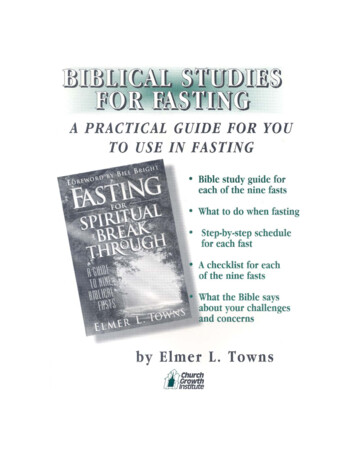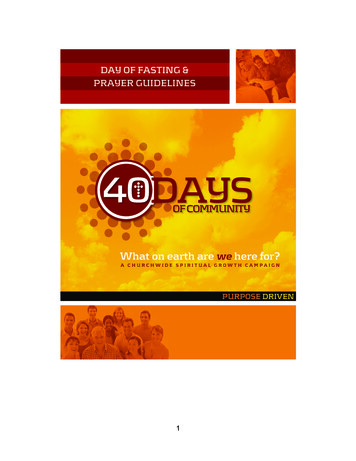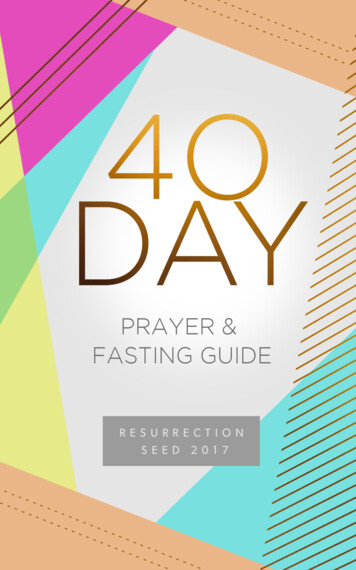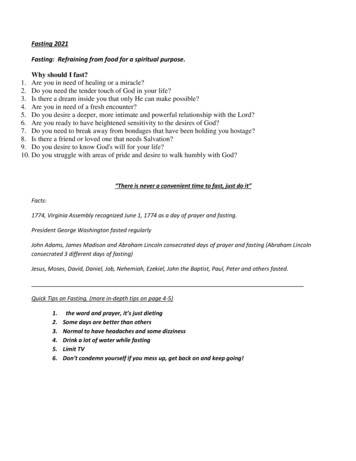
Transcription
Bible StudiesforFastingfor Personal and Group StudyElmer L. Towns
Bible Studies for Fastingfor Personal and Group StudyGetting Started1.The Disciples’ Fast to Break AddictionPreparing to Fast the Disciple’s FastRecognizing Who I Am “In Christ”Finding Light in the Midst of DarknessSoftening a Hardened HeartReplacing Pride with HumilityYielding to God and His AuthorityLearning from the Disciple’s Fast2.The Ezra Fast to Solve ProblemsPreparing to Fast the Ezra FastRecognizing the Value of ProblemsIdentifying the Source of My ProblemsDeveloping a Problem-Solving StrategyLearning from the Ezra Fast3.The Samuel Fast to Win People to ChristPreparing to Fast the Samuel FastUnderstanding the Nature of RevivalRecognizing the Dimensions of EvangelismDiscerning the Role of Prayer in EvangelismLearning from the Samuel Fast4.The Elijah Fast for Emotional ProblemsPreparing to Fast the Elijah FastLearning How Bad Habits Are FormedLearning How Good Habits Are FormedDeveloping a Habit-Busting StrategyLearning from the Elijah Fast5.The Widow’s Fast for Humanitarian NeedsPreparing to Fast the Widow’s FastUnderstanding My Social ResponsibilitiesRecognizing Genuine Needs Around MeResponding in Wisdom to Meet NeedsLearning from the Widow’s Fast6.The St. Paul’s Fast for Insight and Decision-MakingPreparing to Fast the St. Paul’s FastLearning How to Make Good Decisions
Living by the Principle of ScriptureDiscerning God’s Will for My LifeLearning from the St. Paul’s Fast7.The Daniel Fast for Health and Physical HealingPreparing to Fast the Daniel FastDeveloping a Healthy Diet and LifestyleUnderstanding How God Heals the SickPraying the Prayer of FaithLearning from the Daniel Fast8.The John the Baptist Fast for an Influential TestimonyPreparing to Fast the John the Baptist FastRecognizing the Value of a Good ReputationRemaining Faithful in the Face of OppositionOvercoming Habits that Hinder My TestimonyLearning from the John the Baptist Fast9.The Esther Fast for Protection from the Evil OnePreparing to Fast the Esther FastRecognizing the Work of Satan in the WorldPreparing for Spiritual WarfareClaiming the Victory Which Is MineLearning from the Esther FastEpilogue
GETTING STARTEDWhen you get ready to fast, first follow each step in the checklist to make sure you fastproperly. Next, there are several Bible studies with each fast to give you a scriptural basis to prayand fast. Study the verses and write out answers to the questions. Then, pray the prayers. Finally,there is a questionnaire to be filled out at the end of your fast to help you learn and grow becauseof fasting.The checklist should be used with the textbook, Fasting for Spiritual Breakthrough,Regal Books, by Elmer Towns. It describes 9 different fasts with 9 different prescriptions, eachfor a different purpose. The Bible studies in this checklist are different from the material in thetextbook. Use this checklist to understand the biblical basis for each fast.1.The Disciple’s Fast: To break addiction.2.The Ezra Fast: To solve problems.3.The Samuel Fast: For evangelism and revival.4.The Elijah Fast: To solve emotional problems.5.The Widow’s Fast: For humanitarian needs.6.The Saint Paul’s Fast: To make decisions.7.The Daniel Fast: For health and healing.8.The John the Baptist Fast: For testimony.9.The Esther Fast: For protection from the evil one.YOUR FIRST FASTIf you have never fasted, begin with the fast which involves not eating solid foods for 24hours. Don’t begin with the Absolute Fast which includes no liquids or solids. Follow theexample of the Jews who fasted sundown to sundown, a Jewish day. Take a small snack in thelate afternoon (English call this high tea) and don’t eat an evening meal, breakfast, and lunch. Donot eat again until after sundown the next day. Spend the time in prayer. Before you fast, writeout the purpose of your fast.GENERAL CHECKLISTPurpose:Fast:What you will withholdBegin:DateTime
End:DateTimeVow:I believe God is the only answer to my request and that prayer withoutfasting is not enough to get an answer to my need. Therefore, by faith I amfasting because I need God to work in this matter.Bible Basis:My Bible promiseResources:What I need during this fastGod being my strength and grace being my basis, I commit myself to the above fast.SignedDate
Chapter 1The Disciple’s Fastto Break AddictionStudy 1Preparing to Fast the Disciple’s FastAs you prepare to fast the Disciple’s fast, complete the following checklist. During yourfast, take time to review the related Bible studies and read the chapter on the Disciple’s Fast inFasting for Spiritual Breakthrough (Regal, 1996). As you fast, be sensitive to the lessons Godmay be trying to teach you about yourself and the problems which concern you most.CHECKLIST FOR THE DISCIPLE’S FASTAim:Disciple’s Fast for freedom from addiction.Vow:I believe there is no earthly temptation that can enslave me but that God has a wayof escape for me (1 Cor. 10:13). I believe the power of the blood of Christ and thestrength of the name of Christ (Acts 3:16; 16:18). Therefore, I am fasting becauseI want the Son of God to make me free indeed (John 8:36).Fast:What I will withholdBegin:Date and time I will startEnd:Date and time I will endDecision:I am fasting toBible Basis:My Bible promiseResources:God being my strength, and grace being my basis, I commit myself to the above fast for God’sglory.
SignedDateDuring my fast, I learned the following about myself:During my fast, I learned the following about my personal bondage to sin:During my fast, 1 learned the following about my compulsive behavior:During my fast, I learned the following about my personal addiction:During my fast, I learned the following about my problems:In light of my fast, I need to make the following changes in my life:Study 2Recognizing Who I Am “in Christ”Jed Clampet could very well be typical of a great many Christians living in the westtoday. Clampet was that poor mountaineer who barely kept his family fed. But then the day camewhen he struck oil while out hunting for food. With his newfound wealth, he and his family wereoff to California and a popular sit-om was born.The irony of Jed Clampet continued in Beverly Hills. Though he was one of the richestmen in the city, he never really adjusted his lifestyle to that of the rich and famous. He continuedto live like that poor mountaineer in a much more comfortable setting. Though he could afford toeat at the finest restaurants, he continued to take his gun out looking for rabbits.Like Clampet, many Christians are living in spiritual poverty in spite of the riches theypossess in Christ. “For all the promises of God in Him are Yes, and in Him Amen, to the glory ofGod through us” (2 Cor. 1:20), but too often we struggle as spiritual paupers in our Christian life.In today’s study, we will look at several verses that help us better understand who we are “inChrist.”
The Apostle Paul used the expression “in Christ” almost two hundred times in his epistlesto describe Christians. This expression describes the intimate relationship we enjoy with Christas Christians. Because we are in Christ, we are “heirs of God and joint heirs with Christ” (Rom.8:17). When we come to realize that we share in the riches of Christ, we will have a newperspective on who we are in God’s sight. This then becomes the basis upon which we live andenjoy the abundant life Jesus promised (John 10:10).Read John 15:15. Jesus talked to His disciples about the special relationship He had withthem explaining it from His perspective. On the lines which follow, describe that relationship inthe form of a personal affirmation of who we are “in Christ.” Write the affirmation in the firstperson singular.“No longer do I call you servants, for a servant does not know what his master is doing;but I have called you friends, for all things that I heard from my Father I have made known toyou”(John 15:15).In Romans 5:1, the Apostle Paul also describes your relationship to God. In that place heuses a legal context to describe how God responds to us “in Christ.” On the lines following,describe your legal standing before God, using the personal affirmation form used previously.“Therefore, having been justified by faith, we have peace with God through our LordJesus Christ” (Romans 5:1).The Bible also describes our relationship to one another in the context of corporateChristianity. Read 1 Corinthians 12:27 and write a personal affirmation of that truth on the linesfollowing.“Now you are the body of Christ, and members individually” (I Cor. 12:27).One of the ways God teaches us who we are “in Christ” is to use descriptive titles whichreflect His expectations in our lives. A football coach may call a promising athlete “Champ” longbefore any awards are won to encourage the young athlete to strive for excellence. What doesGod call us in Ephesians 1:1? What does this tell you about His expectations for you?“Paul, an apostle of Jesus Christ by the will of God To the saints who are in Ephesus, andfaithful it Christ Jesus” (Ephesians 1:1).
Just because God may have certain expectations for us does not mean we must constantlystrive to meet His approval. God loves us unconditionally. Many people find that hard to acceptbecause they have never been loved that way by others. According to Colossians 1:14, how hasGod demonstrated His unconditional love to you? How does it make you feel as you understandthis truth as a part of your Christian experience?“In whom we have redemption through His blood, the forgiveness of sins” (Colossians1:14).Many children raised in dysfunctional homes are conditioned to think of themselves asinadequate or incomplete in some significant way. Our relationship to God “in Christ” alsospeaks to this very real need in our life. Read Colossians 2:10. On the lines following, write apersonal affirmation of who you are in Christ relating to this personal need.“And you are complete in Him, who is the head of all principality and power”(Colossians 2:10).Read Colossians 3:3. What has God done to secure your relationship to Him?“For you died, and your life is hidden with Christ in God” (Colossians 3:3).Many of us struggle with security in relationships. You can only be dumped so manytimes before it starts to color your perspective. Read Romans 8:1-2. Explain why you can beconfident in your relationship with God never having to fear being dumped by God.“There is therefore now no condemnation to those who are in Christ Jesus, who do notwalk according to the flesh, but according to the Spirit. For the law of the Spirit of life in ChristJesus has made me free from the law of sin and death” (Romans 8:1-2).
When you are confident of God’s love for you and the security of your relationship withHim, problems which come your way do not have to overwhelm you. Read Romans 8:28. Whatdoes this verse tell you about problems in your life?“And we know that all things work together for good to those who love God, to thosewho are the called according to His purpose” Romans 8:28).Problems which may come your way are not an indication of God’s hostility toward you.The nature of unconditional love is that it is unconditional. Read Romans 8:35, 38, 39. What dothese verses teach about the security of your relationship to God?“Who shall separate us from the love of Christ? Shall tribulation, or distress, orpersecution, or famine, or nakedness, or peril, or sword? . . . For I am persuaded that neitherdeath nor life, nor angels nor principalities nor powers, nor things present nor things to come, norheight nor depth, nor any other created thing, shall be able to separate us from the love of Godwhich is in Christ Jesus our Lord.” (Romans 8:35, 38, 39).The fact of God’s unconditional love should not be used as an excuse for not growing torealize your potential. God’s love and concern for you should encourage you to become all youcan be in Christ. Read Ephesians 2:10. What term does God use to describe you in that verse?How does it make you feel when you see yourself in that context?“For we are His workmanship, created in Christ Jesus for good works, which Godprepared before hand that we should walk in them” (Ephesians 2:10).God does not create a work of art to merely sit on a shelf or hang on a wall to be admiredby others. Rather, He has a specific function in mind for each of us. In Matthew 5:13-14, Jesusused two metaphors to describe us. On the lines following, rewrite each of these metaphors as apersonal affirmation of your significant role in society.“You are the salt of the earth; but if the salt loses its flavor, how shall it be seasoned? It isthen good for nothing but to be thrown out and trampled under foot by men. You are the light ofthe world. A city that is set on a hill cannot be hidden” (Matthew 5:13-14).
The verses we have looked at in this study are by no means exhaustive. They are asampling of the many ways Christians are described in the New Testament. Did you learnsomething new about yourself today? Perhaps you discovered something new about your networth in the eyes of God. Conclude this study by thanking God for what He has done and iscontinuing to do in your life. As you prepare to pray, complete the following statement.The most significant thing I learned about myself today isPRAYERLord, I thank You for dying for my sins and accepting me in Jesus Christ. I thank You formaking me Your child and giving me eternal life. I accept my new position “in Christ” and willlive as You expect Your children to live. Help me to live above the trials of this life and reflectYour glory in all my life. Amen.Study 3Finding Light in the Midst of DarknessDuring World War II, a little known strategy was used to confound Adolph Hitler andhelp insure the ultimate victory of the allies. When it became known that Hitler often consultedastrologers and considered their advice before making major decisions, stories began to appear inthe major newspapers of Europe of an astrologer with amazing psychic ability. According topublished reports, this man had accurately predicted a number of significant events and wasregularly being consulted by the rich and famous. It was not long before news of this psychicreached the German leader and a meeting was arranged between these two men.At that meeting, Hitler heard the psychic tell him things about the war effort that were notcommon knowledge. Also, the psychic was able to accurately predict which cities would betargets of allied bombing raids. Impressed with the man’s psychic abilities, Hitler drew him intohis circle of close advisors. During the remaining years of the war, the psychic served his newclient as a part of the inner circle of the German High Command.What Hitler did not know was that his psychic advisor was not all he appeared to be. Hewas really an English spy who depended upon British intelligence for the advice he would sharewith his client. As the spy’s influence grew, he was able to manipulate Hitler into doing exactlywhat the Allied leaders wanted him to do. Well planned military campaigns that had a reasonablygood chance of success were delayed while others were pushed ahead of schedule.Just as a master deception helped confound the German war machine, so deception canplay a major role in frustrating us in our Christian life. Jesus described the Devil as a liar (John8:44), so we should not be surprised that he makes use of deception in his work against thechildren of God. What is surprising is how often we assist the Devil in his work by deceiving
ourselves. Let’s take a closer look at this matter of deception and how it can be best dealt with inour life.Read Psalm 51:6. How important is our personal integrity to God?“Behold, You desire truth in the inward parts, and in the hidden part You will make me toknow wisdom” (Psalm 51:6).What advantage is there to being a person characterized by integrity rather than deceit orguile?“Blessed is the man to whom the Lord does not impute iniquity, and in whose spirit thereis no deceit” (Psalms 32:2).Jesus identified a direct relationship between personal integrity and liberty from spiritualbondage. Read John 8:31-32. What discipline in the Christian life will help you “know the truth”and experience a fuller measure of liberty in Christ?“Then Jesus said to those Jews who believed Him, ‘If you abide in My Word, you are Mydisciples indeed. And you shall know the truth, and the truth shall make you free” (John 8:31,32).To become people of integrity, Paul advises us to take two specific actions. ReadEphesians 4:25, then list each of these actions on the following lines.“Therefore, putting away lying, ‘Let each one speak truth with his neighbor,’ for we aremembers of one another” (Ephesians 4:25).As we begin “putting away lying,” a good place to start is with the lies we tell ourselves.The New Testament suggests several ways in which you may deceive yourself. Read James 1:22.How can you deceive yourselves in our response to God’s Word?“But be doers of the word, and not hearers only, deceiving ourselves” (James 1:22).
Read 1 John 1:8. How does your attitude toward personal sin in your life reveal the extentto which you may be deceiving yourselves?“If we say we have no sin, we deceive ourselves, and the truth is not in us” (1 John 1:8).Pride also has a way of blinding us to the light of God. Read Galatians 6:3. On the linesfollowing, paraphrase this verse in the first person singular.“For if anyone thinks himself to be something, when he is nothing, he deceives himself’(Galatians 6:3).One of the ironies about self-deception is that we are often the last to realize what ishappening. Read 1 Corinthians 3:18. On the lines following, list areas in your life which shouldbe reexamined to identify self-deception which may exist.“Let no one deceive himself. If anyone among you seems to be wise in this age, let himbecome a fool that he may become wise” (1 Corinthians 3:18).Read Galatians 6:7. Think of your actions in the past twenty-four hours. What are thelikely long-term consequences of those actions? Which actions do you need to work onchanging?“Do not be deceived, God is not mocked; for whatever a man sows, that he will alsoreap” (Galatians 6:7).Perhaps the most significant area in which many people deceive themselves relates totheir eternal destiny. Read 1 Corinthians 6:9. Have you been deceived into believing you will goto heaven without being converted to Christ? If so, talk to someone who has a personalrelationship with Christ about being converted.
“Do you not know that the unrighteous will not inherit the kingdom of God? Do not bedeceived” (1 Corinthians 6:9).Even those who are converted need to take actions to insure their behavior is consistentwith the gospel. Read 1 Corinthians 15:33. Are you involved with groups or places that are likelyto have a corrupting influence in your life? Make a specific list of these danger areas.“Do not be deceived. ‘Evil company corrupts good habits’” (1 Corinthians 15:33).As you read those verses, did you discover areas where you have been deceivingyourself? It is only natural for us to want to see things the way we want them to be instead of theway they really are. But when we deceive ourselves, we keep ourselves bound in spiritualdarkness rather than walking in the light with Christ. Stepping out of darkness into the light isnot easy, but it is necessary if we are to experience the liberty Christ has promised those whowalk in the truth. As you conclude today’s Bible study, use the following prayer to address thoseareas in which you have been deceiving yourself.PRAYERLord, I agree that I have been deceived in the area of .Thank You for forgiving me. I commit myself to know and follow Your truth. Amen.Study 4Softening a Hardened HeartWhen asked to explain why Moses allowed the practice of divorce in the law, Jesusattributed it to “the hardness of your hearts” (Matt. 19:8). He explained marriage break-upsuniversally involved one or both parties developing a hardened heart toward the other. Thisproblem infects all relationships. As parents and children harden their attitudes against oneanother, conflict begins to characterize that relationship. As various ethnic groups in a cityharden their attitudes against one another, racial conflict takes root. As nations harden theirattitudes against one another, the threat of war looms.Some observers fear this hardness of heart is increasingly becoming a norm in attitudes ofthose of us living at the end of the twentieth century. Former President George Bush once calledhis people to become “a kinder, gentler nation.” Civic leaders in many cities have called forgreater racial harmony in their communities. World leaders have attempted to intervene to bringend to ethnic wars in various nations, apparently with little success.
Our increased hostility to one another is the product of at least two major influences inour world. First, throughout the last half of this century, we have been conditioned to become aconsumer society. The question which best reflects the motive of many in our society today is,“What’s in it for me?” Second, increased global competition in the new information age meansmany of us are working harder for less than we had previously. It is easy to become meanspirited under such circumstances.But Christians are supposed to be different. As Jesus met with His disciples for the lasttime before He was betrayed and crucified, He took time to teach them certain essentials thatwould help them remain distinctive in the world after He was gone. Many of these distinctivesdealt with attitudes which would be their motives for action. Read John 13:34-35. What did Jesusidentify as the distinguishing mark of His disciples?“A new commandment I give unto you, that you love one another; as I have loved you,that you also love one another. By this all will know that you are My disciples, if you have lovefor one another” (John 13:34-35).The ability of His disciples to get along with one another was crucial to Jesus. In fact, thiscommand is repeated twelve times in the New Testament. Jesus saw it as essential to success inaccomplishing His greater purpose in the world. He expressed this thought later that evening asHe prayed to His Father. Read John 17:20-21. Why is a loving bond of unity among us as Hisdisciples today so important to Jesus?“I do not pray for these alone, but also for those who will believe in Me through theirword; that they all may be one, as You, Father, are in Me, and I in You; that they also may beone in Us, that the world may believe You sent Me” (John 17:20-21).Unfortunately, many of our relationships are not characterized by oneness of spirit. Whenindividuals in relationship with one another do not work hard at “loving one another,” the normalstresses of that relationship are magnified. Ultimately, fractured relationships experience acomplete breakdown and cease to exist. Read Matthew 19:8. How did Jesus describe the cause orbroken relationships?“He said to them, ‘Moses, because of the hardness of your hearts, permitted you todivorce your wives, but from the beginning it was not so’” (Matthew 19:8).
A hard-hearted attitude is expressed in various ways. Read Ephesians 4:31-32. Note thesix characteristics of a hard heart described at the beginning of that verse. HowdoesPauldescribe the attitude which ought to characterize Christians?“Let all bitterness, wrath, anger, clamor, and evil speaking be put away from you, with allmalice. And be kind to one another, tender-hearted, forgiving one another, just as God in Christalso forgave you” (Ephesians 4:31-32).Certain consequences are associated with allowing Your heart to become hardenedtoward others. One of those consequences involves the influence of Satan over you. Read 2Corinthians 2:10-11. What do these verses tell you about the spiritual consequences of anunforgiving spirit?“Now whom you forgive anything, I also forgive. For if indeed I have forgiven anything,I have forgiven that one for your sakes in the presence of Christ, lest Satan should take advantageof us; for we are not ignorant of his devices” (2 Corinthians 2:10-11).A hard-hearted attitude toward others will also impact your relationship with God. ReadMatthew 18:34-35. What risk do Christians take in their relationship with God?“And his master was angry, and delivered him to the torturers until he should pay all thatwas due to him. So My heavenly Father also will do to you if each of you, from his heart doesnot forgive his brother his trespasses” (Matthew 18:34-35).In contrast to the consequences of an unforgiving hard heart, significant long-termbenefits are associated with being tender-hearted toward one another. Read Romans 2:4. Howdoes God’s goodness influence change in your life? Could a better attitude on YOUR partproduce a similar change in someone else for whom YOU care deeply?“Or do you despise the riches of His goodness, forbearance, and longsuffering, notknowing that the goodness of God leads you to repentance?” (Romans 2:4).
Softening a hard heart is hard work. No magic formula can immediately resolve thisdifficulty. Rather, some principles which, when applied consistently, will change your hearttoward others. Read Ephesians 4:26-27. What are two ways you can deal with conflict in yourrelationships to insure they do not fester and cause your heart to harden?“Be angry, and do not sin. Do not let the sun go down on your wrath, nor give place tothe devil” (Ephesians 4:26-2).Paul discusses another important principle that will help often your heart toward others.In Romans 12:19, Who is responsible for “getting even” in your relationships? How does thisknowledge affect the way you deal with offenses?“Beloved, do not avenge yourselves, but rather give place to wrath; for it is written,‘Vengeance is Mine, I will repay,’ says the Lord” (Romans 12:19).When Jesus talked about loving one another, He spoke of a kind of love that wasexpressed in specific positive actions. Read Luke 6:27-28. On the lines following, list three waysyou can demonstrate love to those who are hostile toward you.“But I say to you who hear: Love your enemies, do good to those who hate you, blessthose who curse you, and pray for those who spitefully use you” (Luke 6:27-28).Many other biblical principles dealing with our attitude toward others prove helpful indeveloping relationships. They may be summarized in one biblical statement. Read Luke 6:36.As you think of a specific relationship in which you are currently involved, list one or twospecific actions you could take to demonstrate the Father’s merciful nature to someone else andlist them on the lines following.Therefore be merciful, just as your Father also is merciful” (Luke 6:36).Hard hearts are more common than we often care to admit. Even those who find it easy toempathize with others can become hard-hearted in relationships. As we conclude this study, usethe following prayer to guide you as you respond to what you have learned.
PRAYERFather, thank You for loving me with an everlasting love. Forgive me for allowing myselfto become calloused in my relationships with others. Soften my hardness of heart in myrelationship with . Help me demonstrate Your love to him/herthis week by . Amen.Study 5Replacing Pride with HumilityThe young preacher had looked forward to that day for years. During his difficult days ofstudy in seminary, he would often encourage himself with the thought that someday he wouldstand behind a pulpit and preach the Word of God. Now the courses were complete, the degreewas earned, and the moment had come. As the congregation concluded the hymn, he adjusted histie and proudly stepped into position to begin his sermon.His chest swelled slightly as he looked out at the gathered crowd. They had come to hearhim preach. With a loud clear voice he began to preach his well-rehearsed sermon. He couldn’tbelieve how good it was to hear his own voice echo throughout the large auditorium.But as he continued preaching, something else happened. First, he lost his place in hisnotes. Quickly he recovered only to discover too late he had skipped ahead to the next point inhis haste. As he tried to incorporate what he had missed, his mouth began to dry. The confidentvoice began to fade as the sermon continued. By the time the sermon ended, the young preacherwas glad to walk quickly back to his seat as someone else led the final hymn. He only wished theseat he now sat in was not in such a public place.After the service, he was approached by a sympathetic parishioner. In a quiet voice sheshared that which she felt her pastor needed to hear. “Perhaps if you had come into the pulpit asyou went out, you would have gone out as you came in,” she explained.It is so easy to become proud even when there is very little to be proud of. In the courseof his public life, Winston Churchill was called upon to make a statement about anotherpolitician with whom he had often locked horns. Churchill explained, “I have always found himto be a very humble man with much to be humble about.” At least part of that statement is true ofall of us. Let’s take a closer look at the problem of pride.Pride and humility are often contrasted in the Scriptures. Read Proverbs 16:18, 19. Whydoes the writer place greater value in a humble spirit than success that might be achieved in cooperation with proud people?“Pride goes before destruction, and a haughty spirit before a fall. Better to be of ahumble spirit with the lowly, than to divide the spoil with the proud” (Proverbs 16:18-19).
Pride is not only self-destructive, it also draws to itself some rather significant opposition.Read Proverbs 3:34. This verse is quoted twice in the New Testament (James 4:6; 1 Peter 5:5).How does God respond to the scornful and proud person? What in your life is lik
The Apostle Paul used the expression “in Christ” almost two hundred times in his epistles to describe Christians. This expression describes the intimate relationship we enjoy with Christ as Christians. Because we are in Christ, we ar











